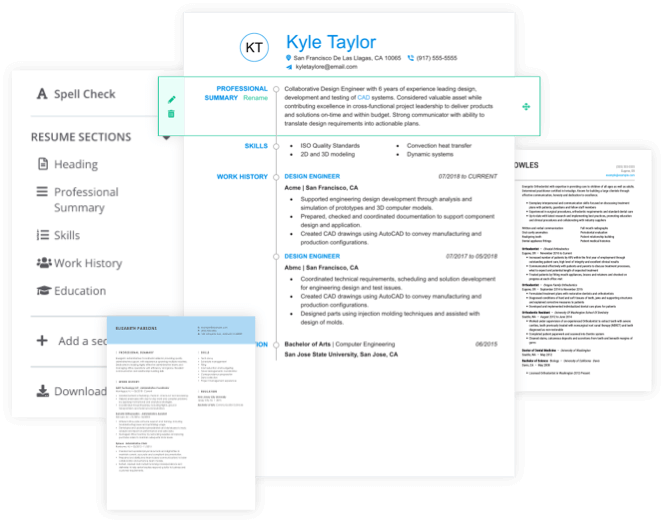- Featured in:

Quality control specialists work in a variety of industries, from manufacturing to food production, and are responsible for checking outgoing products to ensure that they are free of defects and produced according to internal specifications and external guidelines. This is a highly detail-oriented role, requiring familiarity with manufacturing and production processes combined with extensive knowledge of specifications and product testing.
Quality control specialists work as part of a manufacturing team, maintaining records of defective materials and ensuring that defective parts are repaired, re-tested, or pulled from production. They may deliver their reports to other team members to address persistent quality issues in manufacturing and identify problem areas.
Our team of certified resume writers have created a library of resume examples to show you how to craft a strong resume. Study them to learn to write your own.
Improve your application with a personal message! Your resume may summarize your qualifications, but a cover letter can help you express your professional accomplishments and working style. Pair these cover letter templates with our builder subscription to unlock AI-powered text templates and professional designs that will help you submit a complete application.
Quality Control Specialist Duties and Responsibilities
No matter the industry or business they work for, quality control specialists can expect to complete the following duties:
Conduct Product Tests and Assessment
The main duty of a quality control specialist is testing and assessing products, usually in an industrial or warehouse setting. The quality control specialist may test parts or products using a variety of techniques, checking that specifications are met and that the product works as intended. In a food production setting, a quality control specialist may be tasked with testing products and packaging in a lab or on the production floor to ensure consistency.
Identify Product Defects
A quality control specialist is ultimately responsible for identifying product defects or potential issues and determining what to do to resolve the issue. This may mean sending the product back through certain stages of the manufacturing process or pulling a product entirely if it does not meet expected standards of quality. The quality control specialist analyzes the results of lab or usability tests to identify these defects and make sure they do not persist.
Record and Report Issues
The quality control specialist also keeps detailed records of product defects or manufacturing issues as they test and assess products. These detailed records can help identify and eliminate recurring problems and also provide a paper trail to aid in accountability and error reporting. The quality control specialist may provide these reports to supervisors or plant managers to help them make decisions about manufacturing processes and practices.
Support Process Improvements
Quality control specialists are also responsible for supporting process improvements throughout the testing and quality assurance processes. If several products arrive with a similar defect, for example, the quality control specialist might make a suggestion to improve a specific part of the manufacturing process. This helps ensure that products are produced consistently and that defects or other errors will not persist throughout the manufacturing process.
Make Necessary Repairs
In some cases, a quality control specialist may also be responsible for making necessary product repairs. If a particular product has a single, minor defect that the quality control specialist is equipped to resolve, then making this repair instead of sending the product back through the manufacturing process can save significant time and contribute to overall cost reductions.
Quality Control Specialist Skills and Qualifications
Quality control specialists need to possess a high level of attention to detail and familiarity with product specifications and expectations. Employers typically hire individuals with at least a high school diploma, along with the following skills:
- Product testing - quality control specialists need a solid understanding of product testing, along with a firm grasp of best practices for testing product construction and durability against specifications
- Assessment and analysis - this role requires significant attention to detail, particularly in terms of assessing a product's quality and analyzing recurring manufacturing errors or defects
- Manufacturing processes - it's also helpful for quality control specialists to have some familiarity with manufacturing processes so they can contribute to error reduction and process enhancements
- Problem-solving skills - effective quality control specialists need to be adept problem-solvers, skilled at proposing and implementing solutions to manufacturing defects and recurring quality control issues
- Communication skills - effective communication is also vital in this role, allowing quality control specialists to inform plant managers and personnel about defects and manufacturing delays
Quality Control Specialist Education and Training
In many cases, quality control specialists can find work with a high school diploma or GED. However, many companies are now seeking candidates who have a certificate in quality control from a community college or technical school. This is typically a two-year program that covers quality control principles and best practices and may prepare students for certification through an organization like the American Society for Quality.
Quality Control Specialist Salary and Outlook
The Bureau of Labor Statistics estimates that the median yearly wage for quality control inspectors is $36,780. The top 10 percent earn over $63,590 annually, while the bottom 10 percent earn less than $21,880.
Employment for quality control specialists is expected to decline 11 percent by 2026 as manufacturers increasingly rely on automated quality control systems and 3D scanners that can quickly take measurements and identify defects. However, some industries such as food production will still rely on quality control specialists.

Helpful Resources
We found a number of resources on the web if you’re interested in learning more about working as a quality control specialist:
American Society for Quality: Certification
read about the certification process offered by the American Society for Quality and how it can improve your job prospects as a quality control specialist
Quality Control, Eighth Edition
Dale H. Besterfield's essential textbook provides an indepth look at the principles and practices of quality control
"5 Quality Assurance Best Practices for Manufacturers"
learn about strategies and techniques for conducting robust and reliable quality control inspections
Fundamentals of Quality Control and Improvement
author Amitava Mitra explores the changing role of the quality control specialist and how they can impact manufacturing practices and procedures
Quality Control Specialist Resume Help
Explore these related job titles from our database of hundreds of thousands of expert-approved resume samples:




